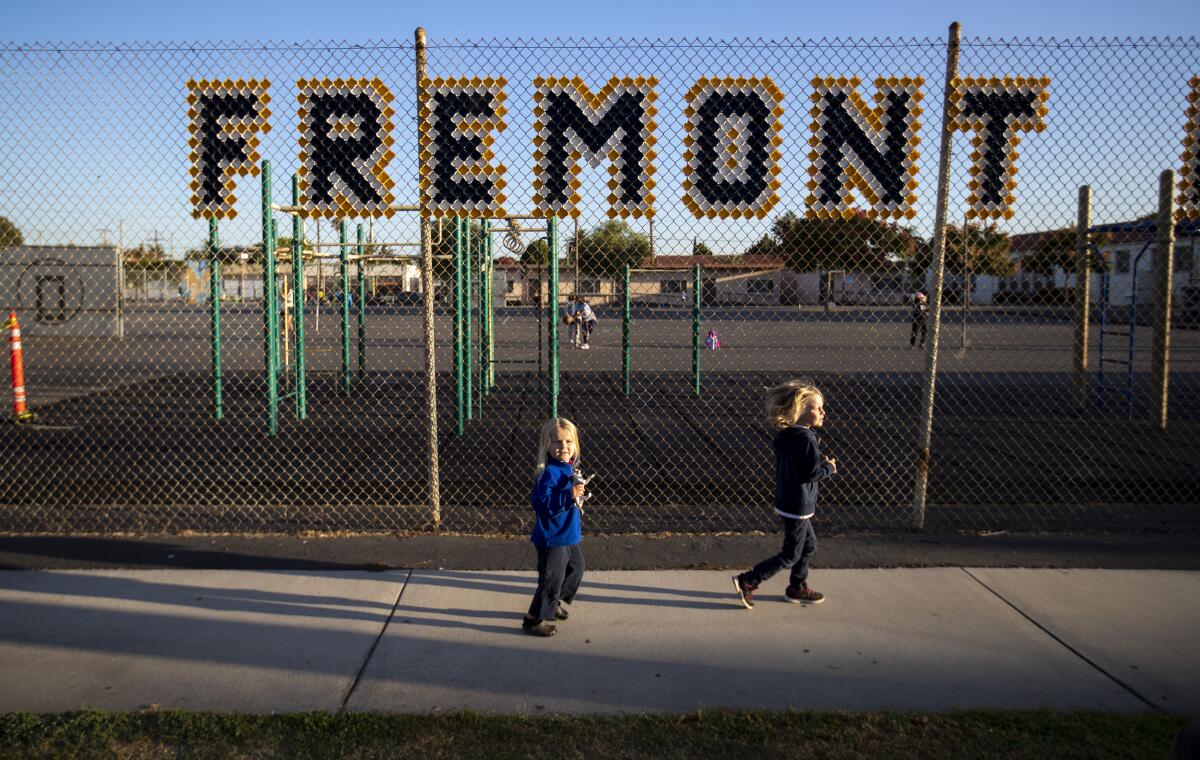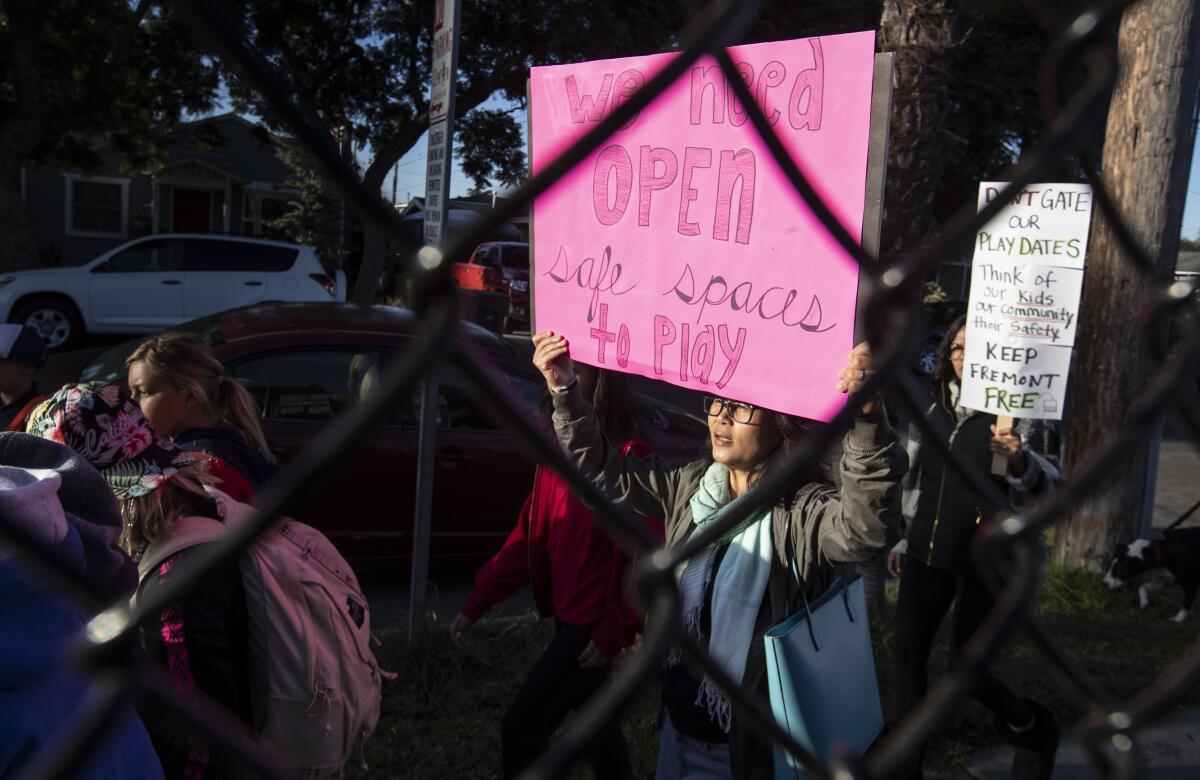Long Beach school locking playground for student safety, but at what cost?

- Share via
When I was a kid, I used to walk to my neighborhood elementary school or junior high on weekends to run around, play ball and hang out with buddies.
But it’s not nearly as easy for today’s kids to do the same. Fences, padlocks and liability fears are the norm. When my daughter was an L.A. Unified student, it used to drive me a little crazy that her elementary school playground sat so close and yet entirely out of reach on weekends, a senselessly wasted neighborhood asset.
In Long Beach, a handful of elementary schools have managed to hold on to the tradition of open campuses. But in the wake of mass shootings and all the fears they stoked, that’s coming to an end, as my colleague Sonali Kohli reported last week.
At Fremont Elementary School in Long Beach, parents got word Sept. 25 that “as part of our district’s commitment to safety … our school will transition into a closed campus that uses an electric visitor screening system.”
We can all agree that the safety of our children is paramount. But can we really make them safer by turning schools into fortresses, or are we deluding ourselves?
Across the street from the school on Monday afternoon, at Viento y Agua Coffee House, I met with Fremont parents who said they’re still hoping a deal can be worked out to keep the playground open weeknights and weekends.
What’s at stake, as they see it, isn’t just a couple of acres of asphalt with basketball courts, monkey bars and other recreational equipment. Cordon it off and you lose a valued patch of shared open space where kids feel safe and free, where parents meet and kibitz, and where a sense of community is more than just an idea.
“It’s incredible how much this brings us together,” said parent Krista Richardson. “I can tell you a dozen stories of people I’ve met there. I’m on the PTA board because of people I’ve met.”
“All our kids learned how to ride their bikes there,” said parent Jennifer Perez.

Parent Jyoti Nanda, a Golden Gate University law professor with a focus on juvenile justice, argued along with the other parents that having a place where everyone feels welcomed, valued and recognized makes for a safer environment. Locking people out, they said, can do the opposite.
Under the plan, Fremont’s fencing will be extended to encircle the entire school. But Nanda said there’s plenty of research suggesting negative psychological impacts on students who are kept behind locked doors to protect them from perceived threats.
As we talked in the coffee shop, I watched students run around on the playground across the street. Short of banning recess and PE, I don’t know how we can keep them or any other students safe on school grounds, during or after school.
And if we’re going to lock school playgrounds on weekends, where do we draw the line? Should we build walls around every rec center and park?
Chris Eftychiou, a spokesman for Long Beach Unified, said most schools in the district had been fenced and secure for years. After the 2018 Parkland, Fla., high school shooting that killed 17 people, some parents called for greater security and even armed guards at elementary schools, Eftychiou said.
The district has since upgraded security at 26 schools, he said, with a half dozen still in line for upgrades. But the school board, according to Eftychiou, is taking seriously the arguments of parents who’d like to keep things as they are at Fremont.
To be fair, Long Beach school officials are motivated by more than just the fear of a shooting. They say they’ve had to deal with vandalism and graffiti, and they worry about being slapped with a lawsuit if someone gets hurt on school property.
Fremont’s principal, Cassandra Richards, told me homeless people sometimes sleep on campus, and janitors often have to remove trash from the grounds before school starts.
And then there are even bigger concerns.
“In this crazy world we live in, someone could always come in on a weekend and plant a bomb,” said Jon Meyer, a member of the Long Beach Unified School District Board of Education.
That is true, but someone could plant a bomb just about anywhere at any time. As for vandals and taggers, it’s not as if a fence can stop them. And in a country that has more guns than people, but whose elected officials refuse to enact common-sense gun control laws even after children are massacred, a fence here and there doesn’t amount to much.
“It’s kind of a double-sided sword,” Meyer said. “To try to open up our playgrounds, yet keep our school yards safe, is a real dilemma.”
Meyer said that when he was a lad in Long Beach, his elementary, junior high and high school campuses were all open and available to him on weekends. He said he and his colleagues on the board, along with district staff, want to explore possible compromises in response to parents who want Fremont to remain open and available.
“I think the bottom line is — where do our children play?” Meyer said. “We’ve pre-empted the little open space there was with homes and businesses, and parents don’t want their kids playing in the street. So where do they play after hours? If not on our school grounds, then where?”
Meyer said he’d like to study a map of the city’s parks and schools and determine whether some campuses, those farthest from park facilities, might be kept open.
At Fremont, some parents were under the impression they’d be able to apply for permits and continue using the playground on weekends. But then they were disappointed to learn they could be charged as much as $60 an hour, and a 30-day notice would be required along with liability insurance.
Given that preserving a sense of community is one objective, maybe one answer is for parents and local merchants or other sponsors to form collectives that assume liability — or share it with the district — and organize supervision of playgrounds on weekends.
Long Beach Unified has a pretty good reputation, parents say, so why can’t it design a workable compromise that can be copied elsewhere?
As it is, public schools are ridiculously under-utilized. Up and down the state, hundreds of libraries, gymnasiums, playgrounds and auditoriums — all of them financed by taxpayers — are off-limits many afternoons, evenings and weekends. We ought to be making greater use of them.
That’s how I feel about it, but I’ll give the last words to Fremont students, some of whom have marched, waved signs and signed petitions to keep their playground open.
“It’s like, the nearest place where we can play,” said Jude, a first-grader who couldn’t comprehend why adults would choose to lock up his favorite playground.
“It feels like another home,” said fifth-grader Lucia.
Her friend Liv, also in the fifth grade, said she’s been playing at Fremont since before she was a student.
“This is the playground I’ve known since my sister went to kindergarten,” Liv said. “I just don’t want them to block if off because so many people love to go there.”
More to Read
Sign up for Essential California
The most important California stories and recommendations in your inbox every morning.
You may occasionally receive promotional content from the Los Angeles Times.














